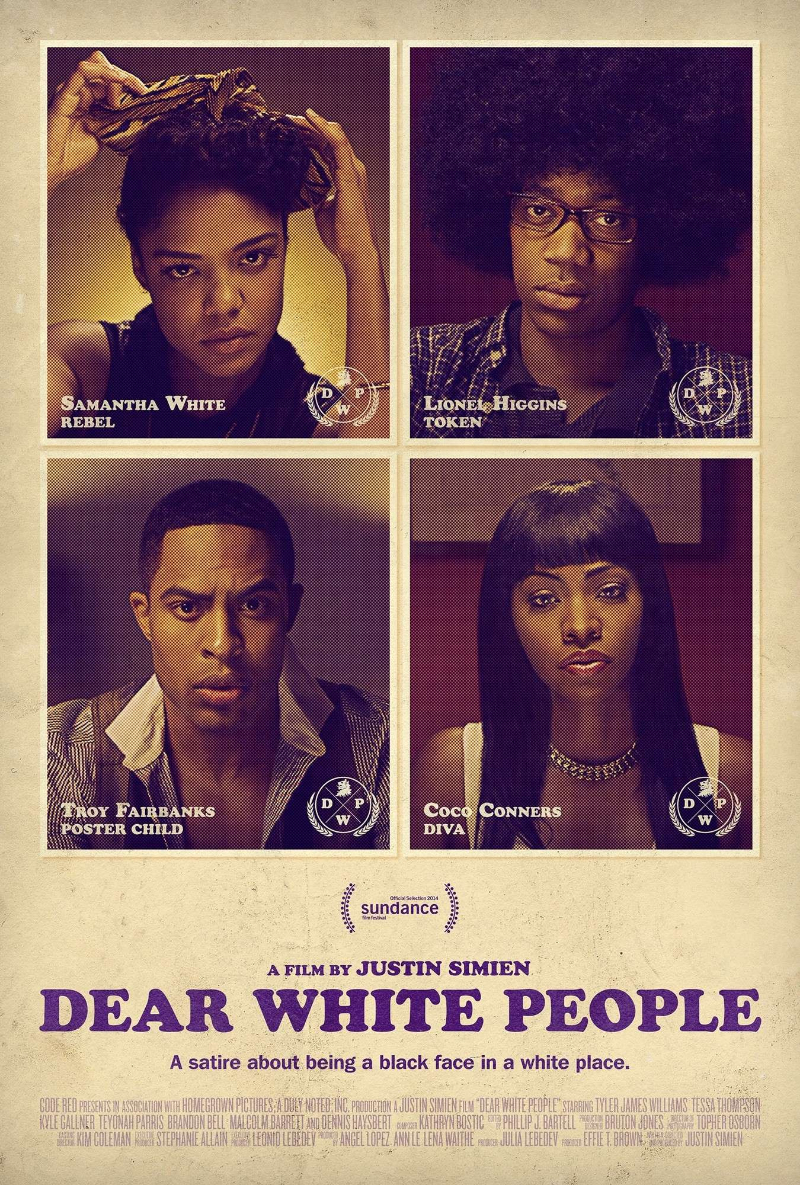Dear White People

Is a bloods and crypts “black face” party ironic, a lampooning of suburbanite voyeurism in an age of multiculturalism? Or is it casual racism, even a mixture of both? These are the sorts of questions that pack Dear White People. A topical labyrinth, the film avoids settling on a definitive message, making its plethora of socio-political digs open to subjective prioritisation.
The central characters Lionel, Colandrea, Troy and Samantha deal with juggling the demands of their racial identities in differing ways, and it is here where the film’s strength lies. Complex, effective characters are a rarity in cinema, and it’s refreshing to see several in one film. Unfortunately, too often, they’re reduced to the director’s mouthpieces, speaking past one another: one moment Sam is defining racism as a one way phenomenon, the next she’s coolly reeling off a Marxist interpretation of commoditised Afro-American culture.
By packing the film with nods to post-colonial theory and other staples of radical thought, Justin Siemens threatens to alienate much of the audience. Mainstream comedy is designed to elicit easy laughs, not require a working knowledge of post-structuralist French thought, which explains divergence between an average IMDB score and a RT rating of 92% fresh. Critics frequently cut their teeth in the progressive halls of humanities, so to them Dear White People is a welcoming boon.
For a purported comedy, its observational humour is mild. The focus on racial politics at a university might have allusions beyond its microcosmic bubble, but it results in a limited variance of laughs. At times its satirical edge amounts to trolling everyone. At one stage a character bleats that political correctness is often a cover for latent racism – you can hear Guardian readers squirm. Alternatively, a casual barb comparing the Republican Party to a lynch mob looks to bait people of a more right-wing disposition.
Interestingly, Siemens acknowledges the internal psychological effects of contemporary racial identity. His character’s motives oscillate between the attraction of breeding out into a vast, global cosmopolitanism, and the comforts of homogenous, ethnic particularism. The chameleon-like character of Colandrea never forgets her working class roots. She confesses: “I want people to know my name”, and Troy aptly asks her “which one?”. Siemens clearly believes this tension is unresolvable, a process of the Western “now”, and irreducible to a partisan decision.
The film’s flaws are more irritations than responsible for its capitulation. Unlike films such as Frank or Chef, where social media is fundamental to the narrative, Dear White People needlessly uses iPhone/Twitter prompts onscreen. Visually it verges on quirky indie territory without descending into total Wes Anderson appreciation. In terms of entertainment, the final act is weak, and more time in the editing room could have led to a punchier film. Overall, though, it covers enough ground to be of interest to filmgoers who demand more than gross humour, raising some incendiary topics for the thoughtful contingent to chew on after the curtains fall.
Mark Warburton
Dear White People does not yet have a UK release date.
Watch the trailer for Dear White People here:

























Facebook
Twitter
Instagram
YouTube
RSS